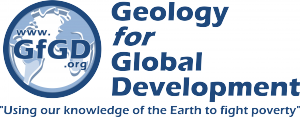 Placements give students a valuable opportunity to get an insight into the international development sector, consider what key skills they need to develop to contribute to such work, and better understand the role of geoscience in fighting poverty. Following successful placements with the NGO CAFOD, GfGD are delighted to announce two new placement opportunities for UK-based geoscience students – both taking place this summer.
Placements give students a valuable opportunity to get an insight into the international development sector, consider what key skills they need to develop to contribute to such work, and better understand the role of geoscience in fighting poverty. Following successful placements with the NGO CAFOD, GfGD are delighted to announce two new placement opportunities for UK-based geoscience students – both taking place this summer.
PLACEMENT A
WHERE: TEARFUND (Teddington, UK)
WHEN: 1st – 12th July 2013 (two weeks)
FULL PLACEMENT DETAILS & APPLICATION GUIDELINES
The successful candidate for this placement will be working with Tearfund’s Disaster Risk Reduction and Environment Adviser. The focus of this two week placement will be the completion of a literature review relating to water management in coastal Bangladesh. The successful candidate will use their critical literature skills and scientific understanding to investigate what others (both academics and multilateral organisations like the World Bank) have been writing and thinking on this topic. You will also have the opportunity to converse with some specialists in Bangladesh. These findings should then be synthesised into a short report.
This placement will also give the successful candidate a preliminary insight into the development sector, and the importance of disaster risk reduction. The student will have the opportunity to hear about a range of projects being undertaken by the organisation and find out more about a career in this sector. It will also give the student an opportunity to make a valuable contribution in the fight against global poverty.
Requirements: The successful candidate should have completed at least two years of study at undergraduate level, and have an interest in water management and/or disaster risk reduction. Experience of completing an extended literature review as part of your study/training is desirable and should be noted in your application. Tearfund is a Christian organisation, but applications for this placement are welcome from those of any religious affiliation or none
PLACEMENT B
WHERE: HUMANITARIAN FUTURES PROGRAMME/BRITISH GEOLOGICAL SURVEY (London and Edinburgh, UK)
WHEN: 1st – 5th July 2013 (one week)
FULL PLACEMENT DETAILS & APPLICATION GUIDELINES
This placement will be jointly hosted by Humanitarian Futures Programme/King’s College London (Mon – Tues) and the British Geological Survey (Edinburgh Office, Weds – Fri). Due to the extra travel involved in this placement, GfGD are making available a small bursary to the successful student. This will consist of an advance purchase train ticket for the journey from London to Edinburgh on Wednesday 3rd July (the student must have a 16-25 railcard) and a contribution of £25 towards the return travel/further expenses. The Humanitarian Futures Programme will also reimburse the student for travel costs within London on the Monday and Tuesday of the placement.
The student placement will be within the stream of HFP work focused on strengthening the dialogue between those with scientific and technological knowledge and those engaged in efforts to support community resilience. The placement will specifically focus on providing support for, participating in and reporting on a collaborative workshop being undertaken joint by a number of UK Natural Environment Research Council (NERC) Knowledge Exchange fellows, the BOND Disaster Risk Reduction and InterAgency Resilience Groups and the UK Collaborative in Development Science (UKCDS).
In Edinburgh you will work with Dr Susanne Sargeant (BGS Seismic Hazard Analyst, NERC Knowledge Exchange Fellow, GfGD Advisory Board), giving you an understanding of how hazard potential from earthquakes is monitored and assessed. Susanne has undertaken work in a number of contexts, including Bangladesh which she wrote about on the GfGD Blog recently, and is part of the Earthquakes Without Frontiers consortium, working to increase resilience to earthquakes in Central Asia, China and Nepal.
Requirements: The successful candidate should have a particular interest in (i) geohazards from either a geology or geophysics background and (ii) efforts to make science useable for supporting community resilience, including by strengthening the dialogue between those with science/technology expertise and those engaged in efforts to build resilience. They should be an enthusiastic and energetic individual, with a willingness to get involved in a wide variety of tasks.
—
Interested students should review the full placement information available on our website, which includes full details of each placement and how to apply. The deadline for all applications is midday on Sunday 2nd June. The successful candidate will be required to sign a Memorandum of Understanding and write a short report for GfGD describing your work, what you learnt and how it benefitted you.

Autoankauf Dortmund
Thumbs up, great articel!